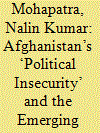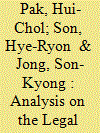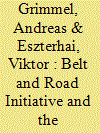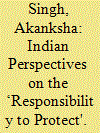|
|
|
Sort Order |
|
|
|
Items / Page
|
|
|
|
|
|
|
| Srl | Item |
| 1 |
ID:
173226


|
|
|
|
|
| Summary/Abstract |
The ‘sustainable peace’ is eluding Afghanistan over centuries. This can largely be attributed to both external geopolitical factors as well as the internal domestic realignments. Often these two factors operate in isolation and at times collude with each other, thus accentuating both domestic and regional instability. The fallout of protracted conflict in Afghanistan in the last few decades has resulted in the emergence of weak governance structure along with the proliferation of radicalism and the flow of narcotics to the neighbouring regions. Eurasia is one such region which has largely been affected by the developments in Afghanistan. The Eurasian states’ engagement with Afghanistan can be looked both through the prism of geopolitical developments that took place in the region following the collapse of the Soviet Union and post-9/11 developments which resulted in the intervention of external actors. The present geopolitical imbroglio is largely emanating from the decision of the United States to leave Afghanistan and the Russian’s desire to fill the vacuum. Iran and China are also engaged in shaping the geopolitical dynamics of this trouble-torn state. India, on the other hand, perceives security and stability of Afghanistan are important for greater regional economic cooperation which will facilitate its effective engagement in Eurasia.
|
|
|
|
|
|
|
|
|
|
|
|
|
|
|
|
| 2 |
ID:
173227


|
|
|
|
|
| Summary/Abstract |
At present, some states are undertaking military interventions in different parts of the world, contending the ‘legitimacy’ of their i006Evocation of responsibility to protect civilians from a humanitarian crisis. Discussions at international forums concerning the concept of Responsibility to Protect (R2P) are inconclusive about its legal nature and application. While some scholars and states support the doctrine of R2P as being legitimate, others challenge or take a rather sceptical view. Divergent views seem to be originating from its incompatibilities with the rules of international law, including the Charter of the United Nations. What is controversial is that the supporters of R2P are mainly from the West, while objections to R2P are from developing countries mainly from West Asia or Africa. This raises concerns about the possibility of future applications of R2P in any of the countries in these regions or other developing countries. The article, analyses the legal nature of R2P in terms of the main principles of international law and other sources of international law and argues that the legitimacy and international legal effect of R2P are uncertain.
|
|
|
|
|
|
|
|
|
|
|
|
|
|
|
|
| 3 |
ID:
173224


|
|
|
|
|
| Summary/Abstract |
This article examines how states may be inclined to adapt to the policy goals of powerful economic partner states in acts of ‘anticipatory conformity’ or by adjusting their ‘common’ policy goals. It builds on two classical theoretical bases—the concept of economic statecraft and Hirschmanesque effects—to explore how economic power may be translated into far-reaching effects on other states’ behaviour without a clear goal or objective being proclaimed or even set by the economically powerful state. Our empirical findings suggest that the European Union still has an unparalleled influence on member states, and China’s growing economic presence in Europe alone—especially in the framework of the Belt and Road Initiative—is insufficient to influence member states’ politics.
|
|
|
|
|
|
|
|
|
|
|
|
|
|
|
|
| 4 |
ID:
173228


|
|
|
|
|
| Summary/Abstract |
The concept of ‘Responsibility to Protect’ (R2P) took shape to refine the contested concept of ‘humanitarian intervention’. In the initial phase, the concept of R2P did not receive enthusiastic endorsement. Developing countries including India perceived it as a new body with the old spirit and likened it with the concept of humanitarian intervention, and this was reinforced by the US-led war against Iraq in 2003. However, the 2005 World Summit proved to be a watershed in the evolution of R2P, just as it is a landmark to understand an important phase of India’s approach to the idea. It would not be accurate to characterize India as a determined nay-sayer on R2P endorsement, particularly in view of the widely known priority India attached at the World Summit to the question of United Nations (UN) Security Council enlargement. Eventually, by 2009 (with the introduction of ‘three- pillar principles’ of R2P), India became a major proponent for the cautious and legitimate implementation of R2P. However, the experiences gained from Libya made India become a voice of caution in invoking forcible options under the R2P principle in Syria. In this article, the attempt has been made to articulate various permutations and combinations regarding India’s evolving approach to R2P on a case-by-case basis
|
|
|
|
|
|
|
|
|
|
|
|
|
|
|
|
| 5 |
ID:
173223


|
|
|
|
|
| Summary/Abstract |
This study seeks to make a modest effort to look back at the marathon peacemaking ushered into by the Treaty of Versailles, during 1919–1922 periods, after Armistice was signed on 11 November 1918, bringing to an end the First World War. It has sought to place under scanner the said arduous process of peacemaking, resulting in an imposing corpus of five treaties comprising 1914 articles with Germany and its four other allies (Austria, Bulgaria, Hungary and Turkey). It presents an interesting role of the principal peacemakers therein along with the advent of the era of ‘organizing’ through the League of Nations and other entities such as International Labour Office and Permanent Court of International Justice. Now, at the distance of 101 years from the main event that heralded new milestones in international law and international relations, we have sought to make sense of it so as to deduce lessons to look ahead for our better world. Knowing well that alike human beings, any peacemaking cannot be flawless, it has been our endeavour to provide an objective understanding of the great peacemaking, its aftermath (1919–1939) and its relevance for the United Nations–led world order in the 21st century.
|
|
|
|
|
|
|
|
|
|
|
|
|
|
|
|
| 6 |
ID:
173225


|
|
|
|
|
| Summary/Abstract |
In the contemporary geopolitical environment, this article outlines the issues and challenges faced by Africa and explores India–EU cooperation in addressing them. An attempt has been made to analyse this cooperation within the context of dynamic changes taking place in Africa. On the one hand, the essence of the phenomenon of Africa as a potential market is presented; on the other hand, it is depicted as a continent of challenges and threats. These factors have been assessed and analysed independent of China’s growing role in Africa. While describing both EU and India’s engagements in Africa, the article outlines specific areas of cooperation including defence and security, development cooperation, trade and investment, infrastructure development, climate challenges, and strengthening institutions of democracy.
|
|
|
|
|
|
|
|
|
|
|
|
|
|
|
|
|
|
|
|
|